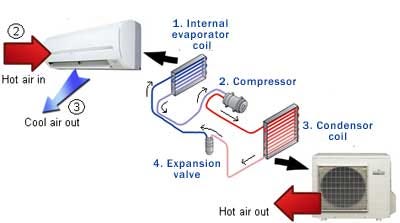Inverter Air Conditioners Works

Inverter air conditioners work by utilizing advanced technology to regulate the speed of the compressor motor, providing more efficient and precise temperature control compared to traditional air conditioning systems. Here is a step-by-step explanation of how inverter air conditioners work:
-
Variable Speed Compressor:
- Inverter air conditioners feature a compressor with a variable speed motor. This motor can adjust its speed based on the cooling or heating requirements of the room.
-
Sensors and Feedback Mechanism:
- The air conditioner is equipped with sensors that continuously monitor the ambient temperature of the room. These sensors provide real-time feedback to the inverter control unit.
-
Inverter Control Unit:
- The inverter control unit, also known as the inverter controller, processes the information received from the sensors. Based on this data, it determines the required speed of the compressor to achieve and maintain the desired temperature.
-
Adjustable Compressor Speed:
- Unlike traditional air conditioners with fixed-speed compressors that operate at full power or are completely off, inverter air conditioners can adjust the compressor speed anywhere between minimum and maximum levels. This variable speed operation allows for precise control of the cooling or heating process.
-
Continuous Operation:
- The inverter air conditioner operates continuously but adjusts the compressor speed to match the current cooling or heating load. When the temperature is close to the set point, the compressor runs at a lower speed, consuming less energy. As the temperature deviates from the set point, the compressor adjusts its speed to meet the changing demand.
-
Faster Cooling/Heating:
- Inverter air conditioners can reach the desired temperature more quickly than traditional models. The variable speed compressor allows for faster cooling or heating by adjusting its speed based on the immediate requirements.
-
Energy Efficiency:
- One of the primary advantages of inverter air conditioners is their energy efficiency. Because the compressor operates at variable speeds and avoids abrupt starts and stops, the system consumes less energy. This leads to reduced electricity bills and a more environmentally friendly operation.
-
Steady Temperature:
- Inverter technology helps maintain a steady and consistent indoor temperature. The continuous adjustment of the compressor speed prevents temperature fluctuations, providing greater comfort.
-
Quiet Operation:
- Inverter air conditioners often operate more quietly than traditional models. The variable speed compressor generates less noise compared to fixed-speed compressors that cycle on and off abruptly.
In summary, inverter air conditioners utilize variable speed compressors and advanced control systems to achieve greater energy efficiency, faster temperature control, and a more consistent indoor climate. This technology has become increasingly popular due to its improved performance and reduced environmental impact.
Thank you,